#crucial historical document. to me
Explore tagged Tumblr posts
Text
I was talking with a friend the other day about how I was fascinated with American school life when I was a teen because it seemed so different from how things are in my country (I knew about US high schools thanks to Hollywood, an accurate and trustworthy source) and we talked about which aspects of US schools felt foreign or strange to us and one thing I brought up was, how American teens only seemed to have like 15min for lunch (I had 1h30 here in France), as evidenced by the cafeteria scenes (no one seemed to eat a proper four-course meal? I definitely never saw a separate cheese course), and I was like, I envied a lot of stuff about US schools but not this
... and I went looking in my old diaries to see if I ever wrote about this, and you know what? I was wrong. I did envy their school lunches which, like almost everything about US schools, felt intriguing and different and cool. The reason middle school-me thought American school lunches were superior to French ones is because, since American teens in TV shows only seemed to get like 4 chicken nuggets and a milk carton for lunch, their lunch tray was very light and they could hold it with one hand under it, the other hand in their pocket or holding their bag strap on their shoulder all casual-like. Sometimes there was no tray, even!
I envied these American teenagers for their lunchtime nonchalance. I would have liked to handle lunch in this cool-cat way but my French lunch tray being loaded with 4 different heavy and breakable plates, I had to hold it carefully with both hands. In my view this was unfair as the hindrance of governmental nutrition guidelines made French students look like uptight nerds, unable to strut around the cafeteria with one hand in our pocket like we didn’t care. Same for the absence of lockers in our schools, we had to carry all our books on our back all day like studious turtles whilst the beautiful 25 year old American teens on my television casually leant against their lockers chatting with friends then strolled around school with just a couple of books tucked under their arm like they were in Dead Poets Society. Thank god there was an ocean between us, imagine a French kid entering a US school cafeteria carrying 3 binders and 5 textbooks in their big rucksack and holding their tray with two hands like a complete loser
Note that these comparisons are quite worthless since I don't know what US school life / food is like in the real world (I imagine it varies a lot!)—I just find it funny to re-read old diaries and discover what was important to kid-me. Discussing these little cultural differences gleaned from US TV series, adult!me is like "yeah I remember being intrigued & envious about a lot of things! Not their school lunches though, they didn't look balanced and nutritious"—meanwhile middle school-me, focused on what mattered, was like, imagine what we could be... imagine being able to hold your lunch tray with 1 hand instead of 2 thus accessing a realm of coolness unfathomable to us in our backward country
#i'm glad i used to spend hours writing diaries... as a kid i never thought i'd enjoy re-reading them later i thought it'd be too mortifying#but no. i'm glad i wrote down for posterity the 4-page-long detailed account of how i embarrassed myself in front of my crush in 2005#crucial historical document. to me
1K notes
·
View notes
Text
whoever advertised scrivener to me i am bowing like a peasant in front of his liege lord this shit is life-changing bro i am saying once again this will save my dissertation writing process i just know it. fairly certain it was @sevarix-blogs king you saved a guy's life for real
#i wrote 666 words today (lol). they aren't good words. but they're words#the way this programme allows me to spew my thoughts on different subjects onto a page without having to scroll through a document#im super bad at just. putting my thoughts onto a page bc im a huge perfectionist#but being able to jump around the different sections of my introduction is such a good way to help with that#i have a Thought about theatre life? i can jump to the section and write some words w/o being distracted by other shit#need to go back and add something crucial that just occurred to me to my historical context? can just switch writing tabs in the binder#the overview and structure! this provides!#and you don't end up with a document full of words where you have no idea what you wanted to edit and what to throw away#can just take it one section at a time#curry rambles#i still need to buy it lol i keep forgetting. before the trial runs out.
5 notes
·
View notes
Text
The Importance of Studying Queerness in Context.
When studying queer history, one always has to keep in mind two seemingly contradictory things: firstly, that queerness and queer people have always existed, but at the same time, that queerness and queer identities have not always existed the way they exist today.
Modern queer terms and identities did not exist to queer people in the past. They would not have thought of themselves as "gay" or "trans" or even "queer." While these modern terms may seem to fit certain historic individuals, these individuals would not have thought of themselves as such, and it would not be a part of their lived experience. To apply the modern identities of queerness to history is to erase the lives and experiences of queer people in history, and care must always be taken to understand queer history within the context of its time.
When looking at queer history online, there is a *lot* of misinformation and misidentification out there simply because people are eager to apply modern queerness to history, often in places where it doesn't belong.
A lot of old photos get misidentified as gay because they show two people of the same sex showing some level of physical affection towards each other. Okay, I'll admit that the open-mouth kissing photobooth pictures are probably actually gay, but an old picture of two men or two women holding hands or with their arms around each other, or even kissing on the cheek, were common shows of platonic affection.




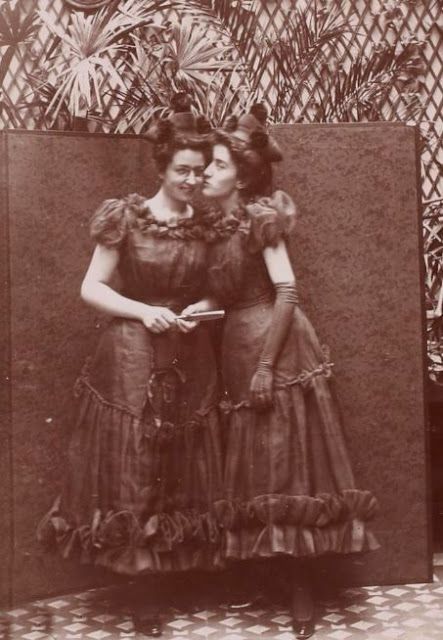

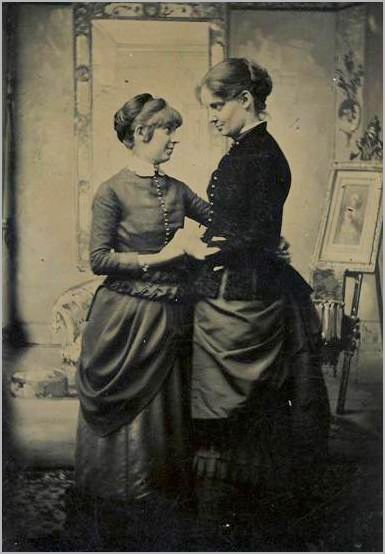
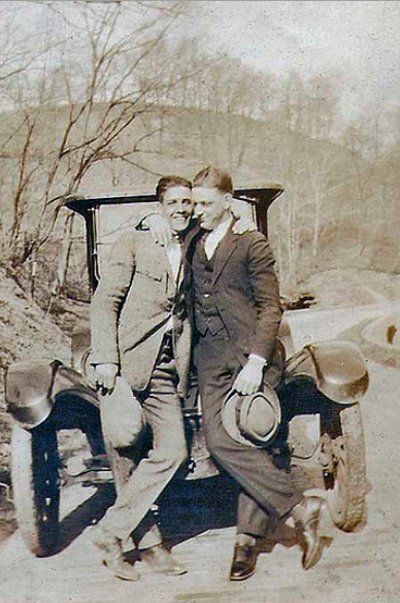
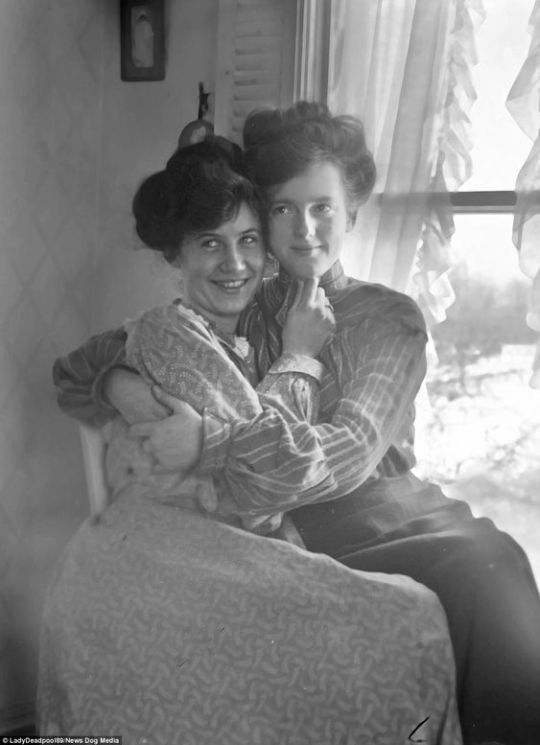
I hate to break everyone's gay little hearts, but without explicit documentation saying so, assuming that these couples are all gay is putting modern queer identity in places where it simply didn't exist. The women in the final picture are sisters. The "not married" boys are bachelors interested in marrying women.
In the silent film Wings, the emotional climax of the film comes in the form of a kiss exchanged between the characters played by Jack Powell and David Armstrong. It often gets attributed as the first gay kiss in cinema history, even on the fucking YouTube clip I found:
youtube
Except it isn't gay. The two men spend the whole film fighting over who gets to be Clara Bow's boyfriend. When Richard Arlen's character is fatally wounded, his dear friend rushes to his side and kisses him goodbye, because in the 1920s, that was considered the ultimate show of friendship. The movie ends with Jack Powell falling in love with Clara Bow.
Similarly, a kiss shared between Lillian and Dorothy Gish in the 1921 movie Orphans of the Storm often gets attributed as being queer, but it wasn't.
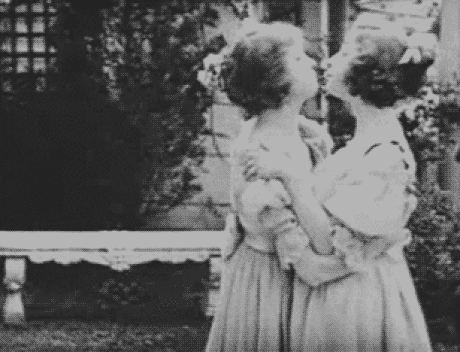
They were sisters playing sisters. None of this was considered unusual.
Pooh-poohing on all of these images that so many people on the internet breathlessly and joyously laud as proud gay history isn't fun. It makes me feel like I'm fucking Ben Shapiro. But if misinformation is allowed to flourish, it allows people like Ben Shapiro to come in and make the argument that queerness is a modern invention and queer people didn't exist in the past.
Everyone loves to see queerness represented in history, but the fact is that none of the stuff in this post would have been seen as explicitly gay and thus shouldn't be called gay today. If we are to understand queer history in its fullness and richness, it is absolutely crucial that we get it right. We owe it to our queer ancestors to recognize, honor, and not embellish the actual lives they lived.
5K notes
·
View notes
Text
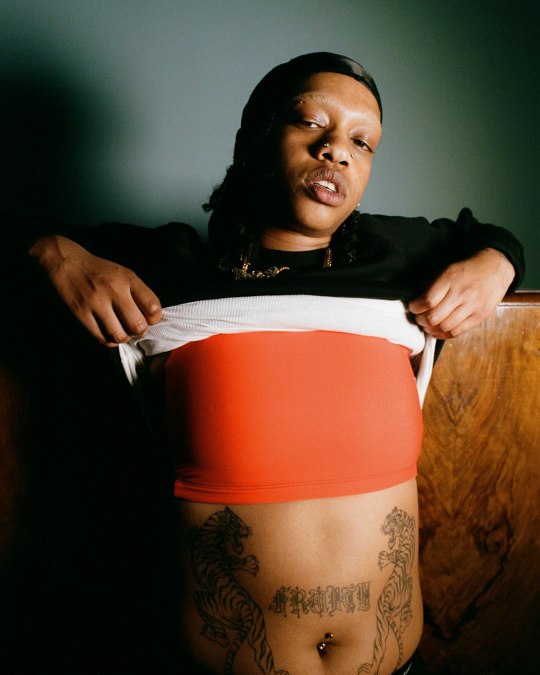
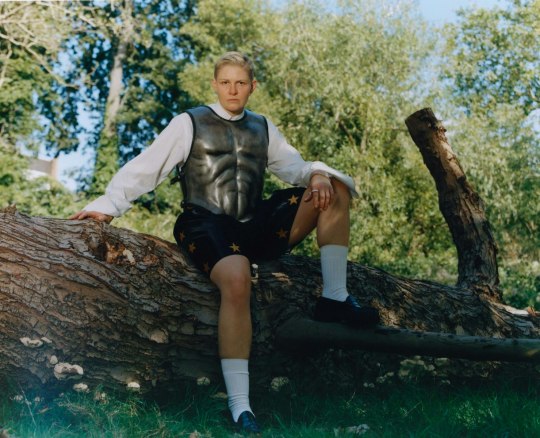
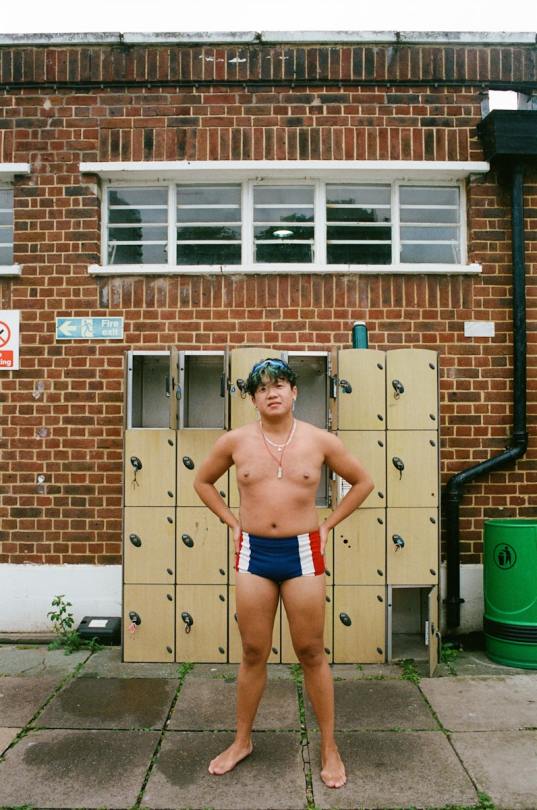
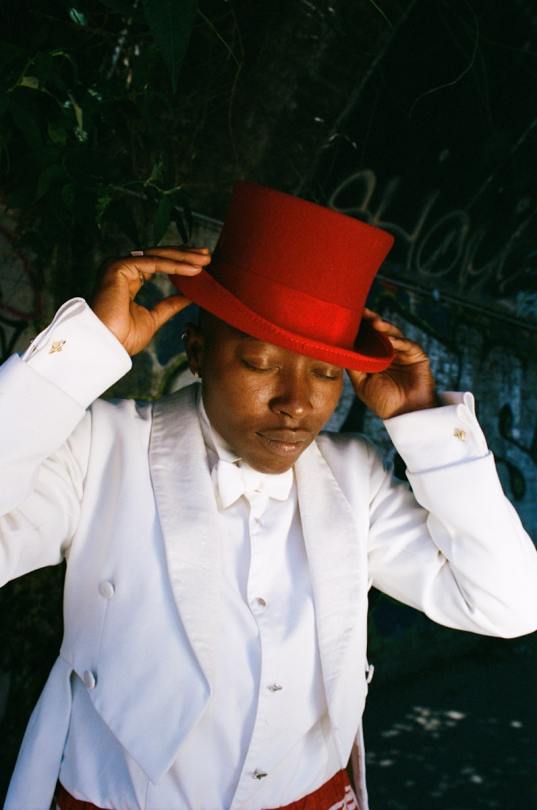
When photographer and filmmaker Grace Pickering was introduced to the work of trans activist Lou Sullivan, it completely changed their life. Born in 1951, Sullivan is thought of as the world’s first documented gay trans man – though, of course, trans people have likely been around for far, far longer. His collated diaries from 1961 – 1991, We Both Laughed in Pleasure, are a pioneering piece of queer literature, or “a radical testament to trans happiness,” as The New Yorker once put it. “Before learning about Lou, I didn’t really understand my identity,” Grace says over breakfast at the art’otel in Hoxton, East London. “He opened my mind up to the fact that so many of my own thoughts were related to my transness – that you could be a dyke fag, I think is the term. He put everything into perspective for me.” It makes sense, then, for Grace to have named their first solo exhibition after Lou’s seminal work. We Both Laughed in Pleasure, which opened last week at the art’otel, is based around a short film Grace shot of their friends and peers, in a bid to shed light on a lesser known facet of the trans experience: transmasculinity and, crucially, transmasc people whose lives are full – of joy, friendship, professional and romantic success. “I wanted to show the nuanced lives that people have,” Grace continues. “Whenever I see transmasc people represented, it’s in quite a stereotypically male way, which I know sounds quite funny. But I think being transmasc is its own thing – me and my friends identify as gay men, even though out in the world I will more than likely be treated as a woman. It’s a different culture.” Alongside the film, which was produced by Greatcoat Films and commissioned by art’otel, Grace will exhibit a series of images inspired by historical trans and nonbinary figures, such as Joan of Arc, who has often been thought of as gender non-conforming; Schuyler Bailar, the legendary openly trans swimmer; and Gladys Bentley, a Harlem musician who would regularly get thrown into jail for the way they dressed in the 1930s. “Gladys would play at jazz clubs and was infamous in that area,” Grace says. “The police would routinely raid the place and arrest them. Gladys would spend the night in a cell and come right back the next day, in their three-piece suit and top hat. And yet they’ve been historically written about as a butch lesbian, despite living as a man. I was interested in showing that.”
from Down in the dumps? Laugh in pleasure at this exhibition
226 notes
·
View notes
Text
I am back.
It’s been a while—almost a year, in fact—since my last update, and I’m excited to reconnect with all of you. This past year has been a demanding one, full of both personal and professional challenges that needed my full attention. However, I’ve also dedicated much of this time to deep, meticulous research for future projects, digging into historical records, academic publications, and original documents to ensure that the new sets I bring to you are more accurate and intricate than ever before.
For those who may be new here, my focus has always been on recreating historical spaces that have changed significantly over time. My goal is not just to reconstruct, but to truly capture the essence of these spaces, complete with the details that give them life. Yet, as I’ve delved deeper into these archives, I’ve come to a realisation: many details I include might go unnoticed, not because they lack significance, but because of how challenging it is to access or even be aware of the sources I draw from.
Take, for example, the king’s bedchamber. The most comprehensive study—Meyer’s 1989 publication—is virtually impossible to find outside select academic libraries. And even when studies are available, they often gloss over the smallest but crucial details. Descriptions of furnishings, for instance, might be reduced to a simple inventory line, like “a set of crimson velvet with two armchairs, twelve stools, and one fire screen.” In reality, however, the original documents hold a wealth of specifics, dimensions, patterns, and descriptions that are almost always left out because they would make publications too dense for a general readership.
So, I’ve decided to bridge this gap myself. My upcoming series will document and examine these rooms in exhaustive detail, focusing not only on the architecture but also on every piece of furniture and ornamentation. These new posts will break down every element, piece by piece, to bring the full picture to light and ensure that my recreations are accompanied by a narrative that truly does them justice.
My first series, which I’m thrilled to share with you soon, will cover the history of the grand bedchamber from the 1680s until today. This in-depth look will span 13 parts, over 30,000 words, and include more than 350 footnotes, most of which cite previously unpublished archival materials. It’s my hope that these detailed breakdowns will not only help you see the care and attention in each model but also make these lost details accessible, allowing everyone to appreciate the full beauty of these historical spaces as they were meant to be.
Thank you for your patience, and I look forward to taking you on this journey with me.
40 notes
·
View notes
Note
Saw a post in the tags; did exandria historically have a thing abt persecuting ruidusborn? The post mind you was largely lambasting the gods along the lines of "these gods should shut the fuck up abt their extermination when their followers in modern day are going after ruidusborn" which... Doesn't seem like the same thing for a number of reasons but also I wanted to ask a wiki person because i didn't think that anyone was actually doing that
Hi anon,
I don't know if I've seen that post precisely - there's a very good chance it's from someone who I have blocked and haven't thought to check to see what wild stabs in the dark they're making now, to be blunt about it - but this is pretty much entirely incorrect and/or deliberately leaving out crucial context.
Exandria historically had a stigma about Ruidusborn. There has been no evidence of widespread persecution specifically for being Ruidusborn. What little negative responses we have seen and have evidence of has either not actually been specifically "this person is Ruidusborn" but rather "this person has uncontrolled and invasive psychic powers that are negatively impacting me specifically and so I am, understandably, put off"; or has been a mere acknowledgement that a stigma exists. Notably, this has not specifically come from followers of the gods. We haven't seen any information about the presence of religion in Gelvaan and Laura herself as Imogen has alternately said once that she did pray to the gods and multiple times that she didn't, so anything here is entirely presumptive. (We also know that Imogen literally didn't know what Ruidusborn were until it was told to her, so I think we can pretty safely say that prejudice against Ruidusborn simply for being born under the moon, rather than like, the invasive psychic powers, was not the issue there). Alma, Orym's mother, mentioned that the Ashari attempt to avoid having Ruidusborn by delaying birth simply because of that stigma (episode 3x66) and the Ashari aren't affiliated with a deity.
The Ruidusborn page on the wiki is here, and you can cross-check with the citations (I am flattered that you ask me as a wiki person, but a wiki is a public document anyone can edit - if you are wondering, and especially if you are trying to debunk something, please cross check citations for the source of truth). I cover the key ones below.
Per Call of the Netherdeep, page 6, the widespread superstition about Ruidusborn themselves is that they are "destined to bring suffering to others, or to experience great tragedy in their own lives". This is actually less harsh than the superstition about those who study Ruidus, who are believed to be "compelled to cause misfortune and woe". Estani, in Episode 3x19 states the following: "Many important, whether for honor or great sorrow, individuals of history have been claimed to have been born under such a ruddy light." We also know, from Call of the Netherdeep, that Alyxian the Apotheon was both Ruidusborn and a devotee of the Prime Deities, receiving blessings from three of them. Obviously Fearne lived a weird and sheltered life, but we didn't find out she was Ruidusborn until we met Birdie, and she never experienced any prejudice about it during EXU or early C3 or really after that, unless you count the fact that people attuned to the conflict on either side (see next two paragraphs) like Otohan and Groon noticed it. In short: the lore about Ruidusborn and the responses to Ruidusborn in history are varied and complicated.
Finally, just from watching the show: people who do not know Imogen is Ruidusborn nor related to Liliana and whom she does not use her psychic powers on tend to respond pretty positively to her now that those powers are largely under control. I've talked before but there is a certain type of fan of Imogen that leans heavily on the "stripped of choice" narrative in which she has never done anything wrong in her entire life and has always been a victim of cruel circumstance (and more generally tends to abdicate all responsibility for their blorbos - and, frankly, themselves - not realizing that people who squirm out of their obligations are loathed for good reason and they're only worsening the response to both their blorbos and themselves). Anyway, the idea that she was persecuted simply for the circumstances of her birth and not that those circumstances led her to do things that are genuinely extremely offputting, even if done involuntarily, is a relic of that "stripped of choice victim" false narrative.
Now: it is technically true that followers of the gods in Exandria in 843 PD are going after a large number of Ruidusborn. If you have been watching Campaign 3 of Critical Role and are not absolutely fucking stupid you may have noticed this is because the Ruby Vanguard, which heavily recruited from Ruidusborn, have instigated widespread unrest and are actively trying to kill the gods by unleashing Predathos. They are not going after all Ruidusborn; in fact, they've worked with several Ruidusborn prior to Imogen and Fearne and their main reason for suspicion was "you are literally the children of generals for our enemies, and also all other Ruidusborn we previously worked with ended up leaving to join the other side", not "you are Ruidusborn and so you are bad." They are going after the army that recruited Ruidusborn to kill the gods. The Ruby Vanguard shot first.
Really, it's the same nonsensical circular logic being put forth re Aeor and Ruidusborn. The people who specifically plotted annihilation of the gods first were Aeor (with the Factorum Malleus) and Ludinus and the Ruby Vanguard (with the Malleus Keys and the intended unleashing of Predathos). To be clear: I am not denying people may have had negative experiences with the gods, but in both cases, their response wasn't to spite them: it was to attempt total annihilation. It was to create something with the intent of destroying every single god. We do have a word for that, and people keep solely using it about Aeor while ignoring it was the instigator. The gods (and their followers) are in both the case of Aeor and the Vanguard responding to an attempt at their extermination, and then these people are like "um, why won't the gods just sit still and let themselves be executed? Figures that these horrible entities are trying to stop the firing squad that has their guns pointed at them. This is just more proof that they should die - what kind of terrible person doesn't lie down and let themselves be killed!"
For what it's worth, I do not think that if Bells Hells and the Exandrian Accord foil Ludinus and the Vanguard's plans they will then proceed to exterminate all Ruidusborn, because their intent is stopping people from unleashing an existential threat that would kill all the gods, not murdering people because they were born during Ruidus flares. The goal here is not extermination; the goal is their own continued survival which requires the painful and difficult choice of sometimes killing those who are dedicated to trying to kill them. This isn't like, a novel concept in fantasy, history, nor ethics, but we are not dealing with the brightest stars in the fandom firmament here.
I mentioned before that I have yet to see a post that posits all the gods should die or that sides with Aeor entirely that isn't riddled with factual inaccuracies from the lore, and that I wish we had "readers added context" options on Tumblr; sadly, we do not. I am happy to answer questions like these, but I do want to encourage people to check the actual text. If anything seems off? You can definitely ask me (and I do have all the CR sourcebooks so if you don't, I get it) but also we've got searchable transcripts that I highly recommend using. Don't take any posts - mine included - at face value if it doesn't line up with what you personally understand. But also make sure what you personally understand is supported by the text.
50 notes
·
View notes
Note
Recently I’ve gotten into genealogy and tracing my family tree, so census data has been integral for me to learn who everyone was, what they did, where they lived and so on. However theirs still many missing pieces of documentation as my family mostly consisted of Jewish immigrants. My family didn’t seem keep anything for future generations, so right now all I have are legal documents and some photos.
Your recent comments on the relation between census data and fascism has intrigued me, and I’m curious if you have any input in regards to my above statement?
im just saying basically that a lot of technological developments regarding dealing with large amounts of data are historically connected to fascism, capitalism, and colonialism. a lot of companies that are known for pioneering things in information technology and record keeping were crucial in organizing the transatlantic slave trade, maintaining colonial governments, and orchestrating the holocaust. i still think that technology (and this includes information technology) is at its core neutral and can be put towards different purposes but its an interesting history that i think should be considered today. record keeping in general is historically connected to kingdoms, empires, and bureaucracies, because societies that develop large governments, have administrative tasks, commerce, territories to control, etc have a need for records and would fall apart without them. its also common that the most accessible and maintained records or census data pertaining to groups of people will be colonial records, and this is a big topic in archival studies. the contents of colonial records can still be useful to research ofc but its a particular form of organizing information
61 notes
·
View notes
Note
top 5 frev women?
Thanks for the ask! Oh, this one's going to be tough as well. But let's see...
Lucile Desmoulins
Much more than a pair of fine eyes, Lucile was, like her husband, heavily invested in politics. She shared Camille's convictions and is even reported to have defended him in front of others. She did pay the price for her loyalty in the end, when she was only my age (though it should be noted that the whole Germinal/Indulgent business is much more complex to be accurately presented in this short overview of course).
I also really like her writing! Her 'advice' to Marie Antoinette is definitely quite something. Go read it if you haven't! Her diary is also at times quite relatable. ("I feel that I am born to live far from men. The more I examine them, the more I seek to understand them, the more I see that one should flee from them.”)
Bonus - my favourite quote of hers on women's place in society:
To hear [men] speak, we are celestial beings, nothing is equal to us. Ah! may they deify us less and leave us free!

2. Simone Évrard
I have to confess I was sleeping on Simone for the longest time, but she is such an interesting figure! She continued to be so supportive of Marat even when times were incredibly tough for him. I'm convinced he wouldn't be able to achieve half as much as he did if it weren't for her. She then went on to defend his legacy long after his death, despite the fact that it caused quite a few problems for her. I find her incredibly inspiring!

3. Charlotte Robespierre
Listen, I'm always going to appreciate a single lady who made it her life's mission to try and take charge of the narrative.
In all seriousness, I'm still not quite sure how her mind worked, but I find her incredibly interesting. Especially the way she seemed to be so protective or Maximilien (re: Éléonore?), both during his life and after his death. She also seemed to have been so strong-willed, much like her brother, perhaps even more so. The fact that she accompanied Augustin to suppress the revolt in Nice is still kind of mind-blowing to me. And the fact that she was supposedly going to marry Fouché at one point? One of my favourite historical what-ifs, honestly. Just imagine!
(That said, my knowledge of her is quite lacking. If anyone can recommend a good biography on Charlotte, I'd be really thankful!)

4. Olympe de Gouges
Okay, here's a controversial one!
Obligatory 'am not a Girondist!', but I feel that I still have to give her some credit for her feminist ideas. Yes, her feminism was centred on upper-class women, but I still see her contributions as an important first step. Déclaration des droits de la Femme et de la Citoyenne is one of the most crucial documents in the history of feminism in my opinion.
I also appreciate the fact that while classist, her feminism was much less 'white-only' than that of a lot of women that came after her (case in point a lot of the Seneca Falls suffragettes in 19th century America). Again, not all of her views on slavery probably stand up to the test of time, but I will always appreciate anyone in the 18th century who expresses abolitionists sentiments, which she did.
She is also the author of many of my favourite french revolution era quotes:
"A woman has the right to mount the scaffold. She must possess equally the right to mount the rostrum."
She has a point and honestly? Well said.
(Side note - also kind of obsessed with her address to Robespierre. "I suggest we should bathe together in the Seine but to entirely depurgate you of those blemishes with which you have smeared yourself since 10th June, we should attach sixteen or twenty-four pound cannon balls to our feet , and together race into the flood ….")
That said, the narrative that she was executed for her feminist views is both incorrect and extremely tiring.

5. Pauline Léon
How can I not mention the leader of female Sans-culottes herself? To counter de Gouges, let me mention another French revolutionary feminist that is - in a lot of ways - an antithesis to Olympe, since she was: a) a radical republican b) a member of the working class.
She seemed to have been incredibly courageous and always managed to find herself right in the centre of the action (Bastille, Champ de Mars...). There are unfortunately not that many resources on her as on some of the other female figures, but I think her story is incredibly important. More so for the fact that she was one of female revolutionary figures we know at least something about that wasfrom a working class - as opposed to upper class - background.
My favourite fact about her is that she wanted to establish all-female militia group to defend the country against counter-revolutionaries. Not going to lie, it was a wild proposal, but it would be kind of amazing to see it happen.

(It was not easy to find her portrait, but this should be her I hope?)
#thanks for the ask!#ask game#french revolution#frev#frevblr#1700s#18th century#women's history#lucile desmoulins#charlotte robespierre#olympe de gouges#simone érvard#pauline léon#maximilien robespierre#augustin robespierre#frev community#jean paul marat#camille desmoulins#french history#feminism#women's rights#hope I didn't get anything wrong feel free to correct me!
40 notes
·
View notes
Note
Any Austria headcanons?
shaking
vibrating
tumbling over
hi. yes. so. enjoy my ramblings of specific Austria | Roderich headcanons from me because my credentials include 5 - 6 years of RP experience writing, researching, writing, musing him
some canon points i took and expanded upon with prevalent historical elements that does fit what i see from the series, certain elaborations that comes from further delve into the unique entanglement of the Habsburg influence upon their claim to the imperial fief of the Holy Roman Empire, the Austrian Duchy
Austria being a far more rowdy, feral, unrestrained youth when the Austrian Duchy absolutely flourished during the Babenberg rule by the successive lead of dukes Leopold. (Yes, dukes. All of them were named Leopold and distinguished only by the numerical order.) During Leopold III, Leopold the Illustrious reign, he was a bit of a punk that not only successfully expanded the duchy with more towns and cities, he joined the third crusade and took command of the German battalion when the previous commander died (Duke Frederick of Swabia). This is the origins of the legend where Austria's flag was created, the signature triband of red, white, red. The Duke's bloodstained uniform when he removed his belt revealed the untouched hidden stripe of white and he went with that - given the track record of these dukes and their prosperous deeds in battle, Roderich would've been that young man who eagerly joined his dukes in each and every conflict, fighting alongside them, and that bit with the bloodstained uniform would've been applied to Roderich as well.
He was a country bumpkin because of this. Had been one since he first came to be, which honestly in my years of writing him is difficult to pinpoint exactly which year given the interesting track records that offers Roman roots (the Noricum province in the then Roman empire), or the first documented use of "Marcha Orientalis" meaning the eastern march, first established by the Bavarian following the battle of Lechfeld in 955 that drove out the rest of the Magyars and fortifying the eastern front once the stronghold is built and fortified. Often I go with this latter interpretation whilst also making good of applying the possible Roman lineage given Noricum was where the land of the east would be. He was just a little country boy Bavaria found after the battle and was like ay yO I GOT A KID.
Bavaria would've spoiled the kid. Cutie. Little march. Sure it's concerning he can already wield a sword but hey you gotta do what you can do to survive! Very apt in swordsmanship and I honestly see his preferred blade of choice is the curved style of a saber, that in turn encompasses his then more outlandish nature - because in sword fighting, saber attacks are far more aggressive despite the refined, graceful look to it. Bavaria would've taught Austria all there is when it comes to fighting when the little march was growing and maturing.
Austria physically matured fast. Which lends itself to the state of his mentality as an empire being pretty fucked because he didn't get to be a child for too long, given how quickly he rose and was refined into this eminent symbol, representative, personification of this imperial fief. During his time as margraviate, he would've already looked like a 10 - 11 y/o pretty soon, then when the later Babenberg generations manage to obtain the Privilegium Minus elevating their territory into a dukedom, he would've had the appearance of a 15 - 16 y/o boy. Because this was a crucial period entering the 1200s onwards, when the succession claim for the duchy became a widely contested issue after the Babenberg line went extinct.
The Bohemian kingdom snatched it pretty quickly with Austrian nobilities actually being in favour for them to rule the duchy, but there was an issue. As imperial fief, the dietary court ruled by the prince electors was the one who called the shots of who'll get to rule the fief next. King Ottokar disregarded this and claimed the duchy for himself and he would've spoiled the Austrian duchy rotten because guess what. Ottokar was incredibly wealthy. I find it absolutely hilarious it was thanks to this man Roderich became... the pampered gemstone he is. To really contextualize how rich Ottokar was, not only was his moniker the Golden King, his earnings was ten times more than the imperial revenue itself that they do not. Want. Ottokar. As emperor. Roderich didn't mind, the former country bumpkin went from a fighter to being throw into this new lavish life where he gets to be comfortable and in prettier clothes, and introduced to Bohemian culture, way of religion, made friends with Bohemia, of course he'd be placated the same way the Austrian nobilities welcomed Ottokar!
Only for his rival, king Rudolf of Habsburg with ambitions to become emperor absolutely get in his way. It was a mess and the then still immature, teenage duchy didn't quite understand the perilous struggle over something he thought was a simple territorial claim and would later learn of the significance when Ottokar was defeated, died in battle, and was finally claimed into Habsburg possession. But it's important to note that Rudolf didn't succeed as emperor. God bless. He was a menace and Roderich would've more than kicked and screamed and tried to bite Rudolf's ear off because guess what. Rudolf was less richer than Ottokar. At least five shillings in bad coin poorer that the country bumpkin having tasted wealth looked at the new ruling figure over his land with disdain because where was the splendour? Where is his comfort?
I may get booed for this but I honestly envisioned he didn't need eyewear until after the dissolution of the empire. Listen to me, he was in good health and perfect physical condition as a rapidly growing fief, he was a good boy who ate his meals, went hunting, practiced his swordsmanship, kept fit, that any and all semblance of incapacitation wouldn't be until after the end that signifies the loss of status and power. The worsening vision thus making him require the glasses on a daily, the frailer physicality simply because in the present day he is not needed to fight, to fend, to exhaust himself tirelessly to grow as a power he no longer was, hence his more laidback habits, hobbies, and being winded easily. And there's nothing wrong with that, you know? He said he wanted to live a good, modest life from here on out and he got that. He's had his run.
Back to more history stuff, remember the bit about his country bumpkin identity? The Spanish Court Ceremonials beat every ounce of it from him. Because one, it was infamously a strict set of conduct by the Spanish constituents in court. And secondly, following the creation of the Spanish Habsburg branch when the succession of marriages into the Spanish monarchy obtaining the crowns of Castile and Aragorn through Maximilian's descendants, Philips and Charles, the Austrians eagerly adopted the customs of their Spanish in laws to foster a harmonious relationship between each other, and in turn Roderich learned the etiquette to a T that perfectly shaped him into the elegant, composed, refined imperium representative he was, finally the revered gemstone befitting the surname he wears; Edelstein. In part, acclimatizing to the Spanish identity was an attempt to better cement his and his first husband, Spain, matrimonial arrangement.
This is completely self indulgent on my part because I love the domino effect and exploring Austria's | Roderich's dynamic with the significant rulers of the dynasty. Maximilian would've been behind the machinations of Roderich's eventual marriage to Antonio. This reflects how his will to bring Spanish inheritance into Habsburg's possessions was achieved when Philip married Joana of Castile, and their heir, Charles, the next Holy Roman Emperor; legitimized the claim over much of the New Worlds and the Holy Roman Empire ... massive wealth and treasure reserves. I imagined the conversation between Maximilian quizzing Roderich on how to better secure their chances of success, thus in turn being one of the rulers that taught the Austrian better when it comes to these political schemes which becomes his weapon later on, telling Roderich to get married. Roderich would have stared and responded, "What?"
Speaking of marriages and the Habsburg being notorious for abusing the ever living daylights out of this strategy? "O'happy Austria, you marry," that saying? The full quote is, "Bella gerant alii, tu felix Austria nube. Nam quae Mars aliis, dat tibi ragna Venus." Let others wage war, but thou, O'happy Austria, marry. For those kingdoms which Mars gives to others, Venus gives to thee. Coined by Matthias Corvinus, the then Hungarian king in the 1400s. And when did Maximilian reigned? 1459 - 1519. The king of the Romans, the most celebrated warlord with a pension for fishing (I kid you not) masterminded some couple of marriages including his own to Mary of Burgundy which brought the possessions of the Low Countries soon into his and the empire's ownership, would have been the instrumental force imparting the wisdom of marriage being the solution to every problem unto Roderich. Young, impressionable Roderich thought, you know what? He's right. Poor Austria didn't think he'd be delivered on the altar is all.
Austria is a polyglot. One, not only are languages and the arts were some of the core subjects for the monarchs, two, Roderich would have more than enough time on his hands to literally retain the fluency of multiple languages. Guess what, another historical tidbit and whom the princess would be inspired by; Emperor Charles. The man could speak an array from French, Dutch, Spanish, even Basque, and Portuguese, and having this disposition to outperform himself each time because Roderich was entangled with that drive to succeed through any and every means, this skill is not only handy but gives him a reason to flex that he can speak Latin still even if rusty from the un-use, Castilian Spanish, Italian, Hungarian, Czech, Dutch, Portuguese, French, the High German in use today, and bit of Polish. Something about it gives him an advantage that if he can find anything, everything to impose himself above a person, Roderich would absolutely refine it.
He is fond of horses. He is absolutely fond of, and would own one of the original dynasty of the Lipizzaner breed. Let him have his immortal pet. Please. Horseback riding is another favourite activity of his in the past, he'd practice it still in present but not at the same capacity and intensity he once did. So a little about the Lipizanner and why they're special - a product of the Habsburgs. They wanted an agile. faster horse and the cross breeding with Spanish breeds resulted in the end product called a Lipizzan, and where it was first conceived was in a stud farm at Lipica (present day Slovenia) established by a Habsburg monarch. I forgot the dude's name but he would've been thrilled unveiling this creation to Roderich, and was gifted one. And if you're wondering, that's right, these same horses are the specially preserved breed in use for dressage at the Spanish Riding School in Vienna. Yet another pride and labour of love of the Habsburgs. And in turn, Roderich.
Austria | Roderich strikes me as the type who'd own two large dog breeds. A German shepherd and Dobermann. Something about this pretty looking man and the scariest dogs guarding him gives such immaculate vibes, and frankly the dogs are required to stave off unwanted attention and bite anyone untowards.
Multiple residences owned throughout the nine federal states of Austria. One, for ease of travelling for work purposes so he'd have a cozy place to stay in and two, it's such a thing that since the end of his major power days, becoming closer to and working alongside his people contributes to his growth and goal of living an honest life for himself that he gets to be an authentic person doing what he believes is the best for his people. As opposed to during his time as an empire, he was too high up and never saw for himself the subjects he ruled when he was the emblem of hegemony.
TBC. Because it's midnight and I am passing out. But. Just.
Yeah
11 notes
·
View notes
Text
Review: The Essence of Shinto

I have written before of Yamakage's authorship of multiple antisemitic conspiracy theory books. That said, given that there are not a lot of English language books about Shintō, I find this book is often recommended. It should not be recommended to anyone, not just because of the authorship, but for its misinformation. There is very little actual information that can be salvaged from this trainwreck of a book.
Koshintō is not an ancient practice - it's a new religious movement; an attempt to imagine an ancient Shintō, which is, in my opinion, inherently paradoxical, as the concept of Shintō as the name of a religion (and indeed the concept of a religion itself) were consciously constructed as recently as the Meiji Era, which is the 19th century. The archaeological and historical truth is that we do not know what Yayoi or Jomon period peoples believed, and Shintō is likely very distinct from that, and that is okay. While I understand the impulse to try to reconstruct Yayoi or Jomon era religions, I find the impulse to remove foreign elements like Buddhism to contain elements of xenophobia, and have found the idea of Shintō as truly ancient to be misleading at best. We do not actually have an ancient practice handed down to us. Japanese religious practice, first, is diverse -- regions do things differently. Kyushu area graves, for example, bear continental Chinese influence and have 土神 enshrined at their sides. Secondly, while I do think there is a necessity to undo the damage that State Shintō has done, it is not helpful to do so in a way that, at best, ignores and at worst, contradicts history.
Secondly, Yamakage Shintō is barely attested outside of Motohisa's writings. Many of the practices allegedly specific to Yamakage Shintō are common Japanese New Age theories, along with some condescension of traditional practices. One way to recognize this is his repeated use of the word "spiritual" (which presumably was either written スピリチュアル in the original text). It's ironic, then, that he puts down "bizarre cults and sects" (p.13). The aforementioned paragraph should explain why I am so skeptical of the Yamakage school when there is no such thing as ancient Shintō by definition.
Crucially, there is some dangerous and typical New Age medical misinformation here. He claims that certain chants or practices can heal different physical and mental health symptoms, which is not something anyone should say, much less someone who claims to be a religious teacher. This is a sidenote, but I am hoping that Paul de Leeuw did not absorb any of this, but am concerned as he trained under Yamakage.
Yamakage states "...Shinto leaders have been at the forefront of campaigns to restore the forests..." As much as Westerners want Shintō to be the Green Religion that saves the world, I've had very little luck actually encountering any shrine websites or articles that back this up, outside of the traditional practices of keeping very small sacred forests known as chinju no mori. If anything, the opposite has been documented. See Sacred Forests, Sacred Nation for more on this subject. I would be open to correction on this, but Yamakage provides no sources whatsoever; in fact, he provides no sources throughout his book for any of his factual or historical claims. Presenting the Showa Emperor as a source does nothing but reinforce fascist rhetoric about the emperor being the religious head, as he was at the time of State Shinto, and likely says more about his personal convictions than his religious ones. There is something eerily dystopian and fascistic in Yamakage's description of the people cheerily following the Showa Emperor's example.
I have noticed a tendency in some Japanese people to do what I think of as self-orientalism; an exoticization of your own body and culture to appeal to whites. It seems to me that Yamakage is doing such a thing, while simultaneously appealing to Japanese nationalistic sympathies, by saying it is an ancient, mysterious religion untainted by materialism. Demonizing materialism, in fact, goes against the actual practice of most Japanese -- many, many businesses regularly pray for prosperity and dedicate lamps to shrines, or will get ritual decorations for prosperity known as kumade during the November Tori-no-Ichi festival.
"Ajimarikan" is a chant that is, at best, shoddily derived from Buddhism, as is his use of mudra hand gestures. At worst, he completely fabricated this chant and doesn't even attempt to provide a meaning for this phrase. The Five Great Vowels Chant and the Heavenly Counting Chant are both chants that do not exist outside of this book.
Yamakage Motohisa also repeatedly uses Okinawan/Ryūkyūan religion as examples as if it is a part of Shintō, which it most decidedly is not. There was forced assimilation because of colonization, to my understanding, but the practice is entirely different from Shintō.
This is kind of a briefer overview than I originally intended, but I hope this provides some information on why I dislike Yamakage and this book so much. My hope is that he stops being recommended as any sort of resource and a better one is translated soon.
42 notes
·
View notes
Note
let’s talk about casey/vale helmet swap https://www.tumblr.com/charlespecco/667773184404324352/they-got-the-taste-for-it
(link)
we should!! dropped everything when this happened, big big day for the feud lovers amongst us. here are the posts in all their glory:


jacket and cap situation - and possibly even cardboard box situation - changed between photos, raising the exciting possibility that more than one meeting occurred at this venue, perhaps even on separate days. and more documentation of the historic event:


casey's got a helmet with a little turtle on it sitting somewhere in his house... peeking at the helmets and the captions, clearly "pleasure" was very much the word of the moment
during that weekend valentino said this:

while casey said this:

discussed here but there really is something to how valentino always talks about casey's talents and casey always talks about valentino's smarts. also details that are important to me personally, like valentino's (sincere) enjoyment of that rivalry, how casey would have enjoyed to see valentino fighting at the front, the learning from valentino thing, this idea of casey's achievements being validated by racing in his era... yeah that weekend gave me a lot
this is obviously all hugely endearing but deadass the funniest aspect of this whole encounter is that like,,, y'know, casey was talking shit about valentino less than a month after the race weekend where they met. I just don't think there's a purer distillation of their unique, beautiful dynamic for casey to show up, take some smiling photos with valentino, say "the pleasure was all mine", while during the same time span extensively having a go at valentino to the press. complete disconnect as ever, this disciplined dedication to never moving on that is... well, I was about to call it 'unmatched', but I suppose valentino shows he can very much match it when it comes to non-casey rivals. the two supreme grudge holders, bless them. like I need to be very clear here that casey was saying this in the very same month in which these photos were taken:

just so charming to me. "the pleasure was all mine" casey are you sure though. zero compunction at chatting shit about valentino in practically the same breath where he's the-pleasure-was-all-mine-ing him, like this is a crucial aspect of his characterisation. these little details like him having another go at valentino over the towing (a lovely theme of their rivalry, casey in general was on a bit of a one man crusade against towing)... "he was good in the head-to-head battles, but also at catching a tow" - there's no real relationship between these two statements, bit of a non sequitur if we're being honest, which is delightful because it lets you know it's something that still pisses casey off years later. one of those things where you can tell he's been sitting on this for nine years, just like the intense ducati schadenfreude - the years have passed, but the emotions never fade <3. "from then on, I didn't want to be his friend" so you wanted to be his friend before that, casey? is that what you're saying? it's so key to this rivalry that every single element of it was felt so intensely by casey.... whereas valentino is going "can't do this, too many memories" buddy full on having his nostalgic moment because this rivalry has just gone down in his mind as a fondly remembered part of his career he has done zero hand-wringing or reflection about in the intervening nine years. what a fantastic little episode like it really nails their dynamic perfectly in the year of our lord 2021
this is why they're great, right... if you put them in a situation where they just talk face-to-face, they would be fine. yeah, even if you made them get dinner together if the premise of the conversation isn't exploring their respective challenges, emotional revelations and soul-searching. their interpersonal chemistry is decent, casey enjoyed chatting to valentino... always, always it was valentino the character and not valentino the person he has his problems with. you can tell valentino thought casey was all right too - the podcast thingy confirmed my belief that valentino just fundamentally did not vibe with jorge from day one in a way that clearly isn't true of valentino's relationship with the other aliens. valentino took one look at jorge and went 'hm this guy seems annoying', but casey? yeah no he'd happily chat with him, just plays it by ear depending on how the rivalry is going and sometimes enforces a little distance just because. no complicated feelings, no massive emotional investment, no compunctions about any element of how that whole story unfolded. when they meet again, there's no real ill will because,, hey, they just did a bunch of things to each other rivals sometimes do to each other, right? whereas casey - my intrepid little grudge holder and reluctant student of the dark arts of communication - doesn't waste the opportunity to proselytise his version of events to the press shortly after the encounter, a tasteful full week after valentino's final race. whole thing fits in perfectly with my thesis that casey sometimes gets to play the valentino role in this rivalry - and does such a lovely job at it. love them both, love this encounter, love that casey's "the pleasure was all mine" is so blatantly flirting with dishonesty. a meeting of the greats
#vale's podcast line about how he deliberately went after casey on the psychological dimension#in some ways the rudest thing he's said since early 2013 where he said the vibes between riders would be better without him there#did a quick google search and luckily nobody's reported on the podcast casey comments. we're good everyone it's all fine#not that casey could complain lol he regularly says way worse#this is what i'm saying about their similarities right...#isn't there something charming about how both of them go onto podcasts at roughly the same rate to chat shit about vale/marc respectively#//#brr brr#batsplat responds#heretic tag#the real lesson is that they both love podcasts#in another life i would have really liked just hosting a conspiracy theory podcast with you
10 notes
·
View notes
Text
Comments by people about how disappointed they are to hear that Etymonline is a pretty bad source for (English) etymology make me realize how spoiled we are in Slovene with the (relative) quality and accessibility of etymological dictionaries.
There are three (modern) etymological dictionaries for Slovene: the standard work by Bezlaj, Furlan and Snoj, ESSJ (Etymological Dictionary of the Slovene Language; 4 volumes + indices; begun by Bezlaj in 1976, joined in the following volume (1982) by his student Snoj and in the third and fourth also Furlan (1995, 2005); Bezlaj died in 1994); Snoj's more "popular science" version, SES (Slovene Etymological Dictionary, 1st edition in 1997, 3rd in 2016, available online); Furlan's much more rigorous and dialectally oriented NESSJ (New Etymological Dictionary of the Slovene Language; trial folio in 2013, online publication since 2017).
As mentioned, SES and NESSJ are available online, though the very limited scope of NESSJ means that SES is the usual reference. There are talks about putting ESSJ online as well, but there are some issues with rights and Bezlaj's family etc.
Before illustrating the differences between the various Slovene and English sources for etymology, a few notes on what a good etymological dictionary entry should include:
philological documentation (current meaning, phonetic/phonological information (incl. suprasegmental features), morphological characteristics (inflection, gender), word family (derivatives, parallel formations), attestation (historical sources), onomastic material (esp. anthorponymy and toponymy)
comparative material (cognates or related words in closely related languages and in the wider language family)
etymological explanation (word form at the moment of creation, morphemic structure, meaning and semantic motivation)
To demonstrate the differences between the dictionaries, it's best to consider their entries for the same words:

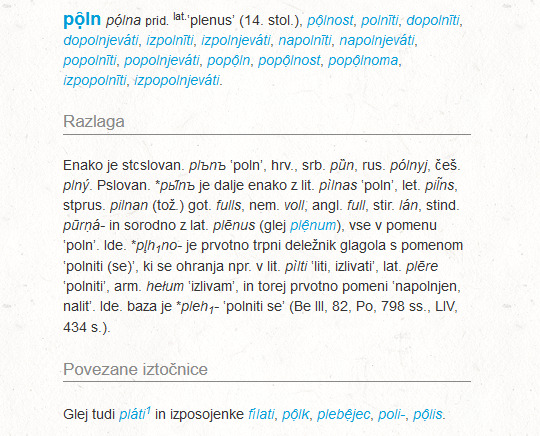
— ESSJ, SES poln, adj. 'full' in ESSJ and SES. NESSJ does not have this word. ESSJ includes more information on Slovene historical and dialectal attestation, as well as all the existing forms in other Slavic languages. SES, on the other hand, besides the relevant derivations only includes those Slavic languages that are more relevant for the Proto-Slavic reconstruction. It is important to note that this entry from ESSJ is from the third volume, which systematically takes into account the findings of the laryngeal theory (you can see that the reconstruction of the PIE root in ESSJ is *pelH-, with a laryngeal, even if it is not specified which one; cf. the update in SES with *pleh₁-). The first two volumes do not, however, and are therefore in many ways superseded by the entries in SES, even if those are otherwise less rigorous.
***at this point I should note that I'll gladly(!) translate all the Slovene entries if anyone wants me to do so, but I'm not going to do it if no one asks because there are quite a few of them here
Compare the entries in popular English online sources for etymology – Wiktionary and Etymonline; and then also Kroonen's Etymological Dictionary of Proto-Germanic for comparison:

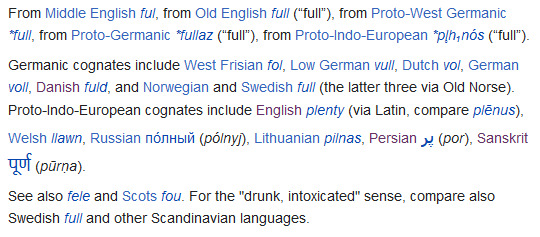

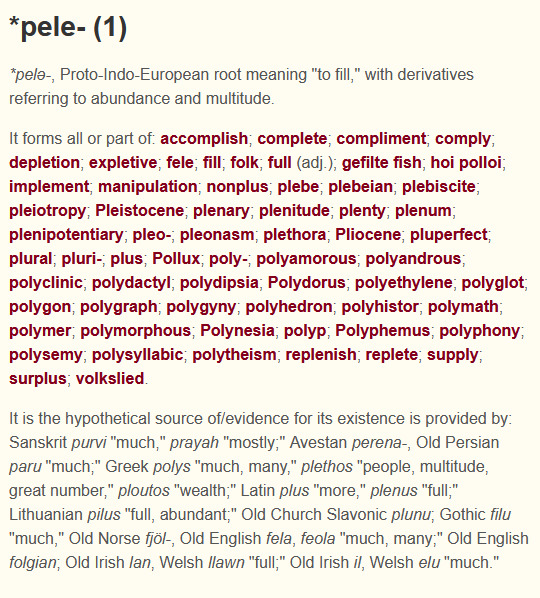
— Kroonen, Wiktionary, Etymonline 1, 2 The Wiktionary entry for full is roughly on par with SES, while Kroonen's Germanic material is more comprehensive. Etymonline, however, shows no trace of the laryngeal theory and when looking at the cognates listed under the root, it's like they've never heard of a diacritic either (except in Old Norse "fjöl-", even though ö is not normally used for Old Norse – ǫ is) – even though those are often crucial! –, not to mention fully replacing ə with e in what should be Avestan pərəna- ...
To also include NESSJ, the word for 'birch' will be used, but first the entries for this word in the already mentioned dictionaries:

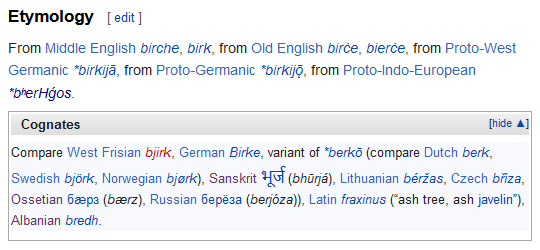
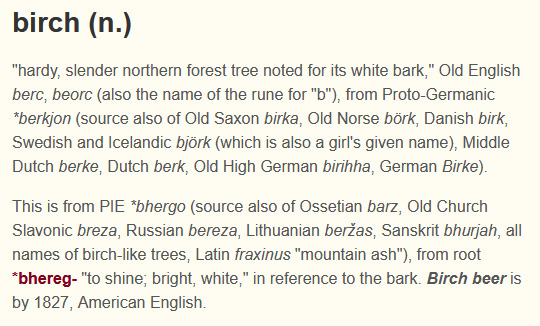
—Kroonen, Wiktionary, Etymonline Again the Etymonline entry just does not compare – it's not just that the PIE reconstruction is non-laryngeal, it's also plain wrong because it has *g instead of *ǵ; also again with the diacritics ...


— ESSJ, SES As you can see, this entry is from the first volume of ESSJ and thus also non-laryngeal. It is still more comprehensive in terms of material, but the explanation in SES is more up-to-date.
The entry in NESSJ simply does not compare to the ones above – it is more in line with a dictionary like the Etymological Dictionary of Slavic Languages (ÈSSJa) in the amount of information it includes, which means that it is so long that I will put it under the cut:

— NESSJ You can see that this entry includes much more dialectal and historical material and discusses in depth its historical morphology and types of derivation, finally constructing its diachronic word-family.
And since I mentioned it, here's also the ÈSSJa entry for 'birch':

— ĖSSJa As it is from the very first folio, from 1974, the explanation is non-laryngeal, as in ESSJ. Compared to NESSJ, it includes (literally) a couple more Slavic languages: Slovincian and Polabian, though understandably no further dialectal material, which NESSJ includes specifically for Slovene. ÈSSJa, as a rule, doesn't reconstruct accentual paradigms for Proto-Slavic, while on the other hand, some of the discussion in NESSJa specifically concerns the question of accentual features of the discussed word and its IE word-family. NESSJ is also more explicit in the discussion of the models of derivation and morphological variants.
34 notes
·
View notes
Text
History through the lens of Unwell: A Midwestern Gothic Mystery
Unwell’s last episode was published on September 12 of 2023, lucky for me I have not yet listened to the fifth season so Unwell can last as long as I want it to. In fact, I don’t want to finish it until I write an article about the story.
This is that article.
History, in the most simple terms I can put it, is the study of the past as it relates to the present. We learn and study it, not just to know what our ancestors in 500 B.C. got up to but to understand ourselves in the wider context that is time, the universe and humanity.
Unwell is a fiction podcast about Lillian Harper moving to the small town of Mt. Absalom, Ohio, to care for her estranged mother Dorothy after an injury. Living in the town’s boarding house which has been run by her family for generations, she discovers conspiracies, ghosts, and a new family in the house’s strange assortment of residents. (Courtesy of unwellpodcast.com)
History in Unwell takes various shapes, the most obvious is the resident historian of Fentwood House: Abbie, who has come to Mount Absolom to pursue a doctorate in history with a focus on urban planning. The Fentwood House itself is a historical site of the town, with Dot (the owner and carer), being a vessel of oral history for it: always talking about different wild anecdotes of her ancestors and the house, there is also the various documents said ancestors left behind, which became a crucial plot point in season 4. And of course, there are the ghosts.
Ghosts on Unwell are complicated to the point that even themselves do not quite understand what they are, but I would like to argue that they are “living” memories of the town.
(Spoilers for the next part).
Nora is the ghost of the observatorium, an astrophysicist from the early 20th century.
Nora’s control and keeping of the echoes people have walk through the observatory could be seen as her “archiving” different moments of Mount Absolom and the voices of different people, plus her astrophysical and engineering knowledge that allows Rudy to fix / continue the creation of the observatory’s telescope (her telescope) is similar to the way people from today look at the discoveries and knowledge from people in the past to further their work.
Wes, who works at Fentwood House, keeps in a way alive the story of the establishment through his spooky tours, and it is through him that we get to see how Mount Absolom in the 40s or 50s looked like.
And then there is Silas, one of the founders of Mount Absolom. Silas or Reverent Lodge, represent that darker history the town wants to erase and/or forget. I do not only mean trying to white-washed it (there’s this nice scene in which Abby calls out the “Thanksgiving” myth) because it is more complicated than that, I think… in a way… Silas is a representation against modernity and expansion: his chapel is under an observatory- like how one may substitute religion for science in the modern world, he is fiercely protective of the forest around Mount Absolom and doesn’t like how the town is expanding to its borders, he reproaches Dot (and others) for forgetting traditions, etc. There is truth to Silas’ critics which is what makes him so compelling, and the fact that through his friendship with Lily he doesn’t appear to be that much of a racist compared to his contemporaries. In other words, Silas is the bogey man that carries with him the past the residents of Mount Absolom don’t want to talk about.
However, Ghosts, Landmarks, and Historians is not only the way that Unwell engages with history. It is the way to move the plot forward.
The characters throughout the story have to engage with the past in order to overcome obstacles. To discover the mystery they end up digging up those sweet first type sources, interviewing people from the past or who know about it, exploring ancient sites, asking the story behind the town’s festival and cultural practices- in a way there is no much difference between a historian and a detective (Abby often wears both hats in the show) just how far away is the moment they are investigating.
A theme of the show is also the power of knowing your history and that of the place you inhabit. If there is a character that embodies this theme the best is not the historian but Wes, there is a difference between the Wes of the first season who just knew where he lived, to the Wes of the fourth season who knows the name of his parents, the school he went to, the detective radio-show he like to listen after school; when Wes learns the history of the boy he was he becomes (as much as you can at sixteen) self-actualized. Dot, on the other hand, has the opposite story as her illness slowly devours the stories she has hanging around in her brain.
And then there is Lily. Lily is a beautifully complicated character, in the beginning of the story she denies any connections or ties she could have to the town, Fentwood House and even her mother, but through the course of the show she is forced to grapple with that notion, to confront her younger self and the relationship she had with her mother, to realize that she too forms part of the history of Mount Absolom, and through that start healing, and help the town heal as well.
I love history, if life is good to me I will probably end up teaching it. But engaging with the past is hard, so much of it is covered in blood, so much of it asks for you to look at the present with other eyes, to reinvent yourself time after time. But there is power in it, there is power in looking at the past and seeing how it reflects in the present, to know that even if you feel alone there were millions before you that paved the path you walk on, to step in buildings or walk through the forest and know they will keep an echo of you as they have for everyone else. Unwell knows that power and it shows it through a story that is engaging and through characters that are captivating.
36 notes
·
View notes
Text
I know Robin is supposed to be fluent in the fantasy Linear B of the poneglyphs, but in the context of my increasingly complicated headcanon, where Croc (and Shivs) find her early on as a 14-year-old, it is much more interesting (and funny) to me if the reality of that ability is more akin to an eigth grader's grasp of English after their first few lessons. Most of it is from historical poneglyphs (they were archaeologists, after all) and mostly useless in the context of super secret weapons of mass destruction. We're not telling them that, though!
Which then caused the related notion that Robin, a tween-going-on-teen in the majority of my ship's main story real-estate, understandably considers herself crucial to everything going on and basically the Chosen One in her own life. "You need me and my special gift but I hate it here and I wish I was normal" she teen rages against her faux adoptive parents made out of literal water and sand, respectively. You can see why that fell flat, I am sure.
This ties directly into the notion that the infamous paperwork Sir Crocodile appears to always be doing isn't actually accounting of any sort. He's just been pouring over the same twenty-something rubbings of poneglyphs trying to pull a Ventris on this fantasy Linear B. After all, we've been deciphering dead languages and ancient scripts without the providential presence of magical teenager who happen to be able to read them fluently for some time now. The texts are few, but there's plenty poneglyphs and fragments out there, so we might accumulate more (and they do, several plot points in several WIPs), and they already know the context of what the critical text is supposed to be about which is a massive help. Because, the irritating part of deciphering a language, is that you need to already know what it is probably saying, to be able to figure out how it is saying it.
But I digress.
Anyway, Croco spending hours and hours pouring over those documents because that's what it takes (and is still taking, raising one for those still tackling Linear A). But as the whole looking-for-battleship-of-mass-destruction is supposed to be a secret, the minute someone enters his study he pulls his agenda and creditcard statements over it. And thus the eternal paperwork impression was made.
Shivs knows about all of this and goes along with it, apparently. He's so focussed on finding this magical-mythical ship and, she's a pirate, she's down with finding this franchise's Flying Dutchman (or Black Pearl?) What am I saying, she's a pirate helmsman, she'd LOVE to sail it, lmao. Mass Destruction whomst? Lets sail this baby into the sunset!
I digress. She Indiana-Joneses around Alabasta every so often, I am sure. I can see that in exactly the way I cannot see Croc crawling through any sort of dusty old tomb looking for new shards of frustratingly indecipherable ideograms for him to start smoking more heavily over.
What I am saying is that I've never been partial to Crocodile being a Big Stupid and that I am getting increasingly invested in him actually being a closet academic. I have a weird spin-off of the Mummy franchise in my head in which Shivs is Rick and Crocodile Evie.
APPARENTLY.
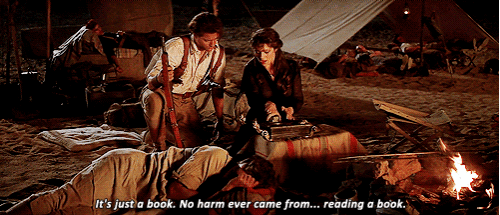
No, I wasn't really going anywhere with this, I just needed it off my chest. @tiredemomama is busy.
You're welcome.
#one piece#one piece headcanon#one piece fanon#sir crocodile#nico robin#poneglyph#headcanon#crocaine#one piece crocodile#op crocodile#buggy thoughts
16 notes
·
View notes
Note
magician reversed for Jaheria 👀
The Magician Reversed (manipulation, poor planning, untapped talents)
They have located the assassin. Beautiful, lithe, incredibly talented, and—crucially—fundamentally disinterested in the jobs she performs. She is overconfident to the point of carelessness; she believes that a mark can be allowed to slip away, because she will certainly track them down later.
The only problem: they have not located her mark. They do not know with any certainty who she will target; the death of any diplomat at this gala would perfectly serve her organization's aims. They need more time to gather information—time they simply do not have. The woman's eyes are already scanning the crowds.
“Any brilliant ideas?” Jaheira asks Thea through the corner of her mouth.
Thea tilts her head at the assassin as if she's considering something. She says carefully, “Yeah, uh, one, but I don't know if you'll love it.”
“Will it work?”
Thea squints. Wobbles a hand in front of her. “Fifty-fifty chance.”
“Worst-case scenario?”
“She throws a drink in my face and tells me to fuck off. Don't think she'll suspect anything, though, so it's low-risk, high-reward if I can get this sorted.”
The assassin's posture is taut, her eyes sharp: a predator about to pounce. Jaheira decides that anything is better than nothing. “Do it,” she says.
Thea glances back at Jaheira with a strange expression—as though she's worried for Jaheira, but doesn't know whether she should be. She moves forward towards the assassin. Jaheira positions herself out of sight and within earshot.
“Drinking alone?” Thea asks.
The assassin looks up. Arches a brow. “Who's asking?”
Jaheira realizes in one fell swoop what Thea is about to do. She feels—she doesn't know what to feel. It is a tactically sound and incredibly sensible move. Thea's romantic exploits prior to Baldur's Gate are historically well-documented. At the very least, she should be able to distract the woman with some well-placed flirtation. This is a good idea. This is a very good idea.
She steps behind a few diplomats and a plant. She's managed to cross sideways and is now just about standing behind the assassin.
Thea's eyes flicker to Jaheira’s. She says, “You know you're the most beautiful woman I've ever met?”
“What?” says the assassin. Her eyes follow Thea's; she moves to turn.
“Oh, nothing over there, look at me,” says Thea hastily, breaking her gaze away from Jaheira's. “Sorry. I.” She mutters, “Fuck,” starts staring at Jaheira again, then says, “It's a bit too hard to look directly at you, you're that lovely. Woman's gotta make a few adjustments.”
Jaheira mouths what is wrong with you. Thea gives her a helpless look.
The assassin lets out a low giggle and says, “You're Althea March, yeah? Is this that patented luckmaiden charm that half the Sword Coast's heard about?”
“The way I get to women,” says Thea, who is still, for some reason, staring at Jaheira, “is I flop around on the floor like a dying fish until something or another lands with them. I've never pretended at being particularly charming, I'm just up-front. Some girls like that.”
“Are you going to look at me any time soon?” teases the assassin. “I can't possibly be that beautiful.”
“Oh, you are,” says Thea. “Easily.”
“How would you know if you're not looking?”
“I'd find you in a dark room,” said Thea. “I'd find you with my eyes tight shut. My whole fucking life changed the minute I met you, Jaheira—”
The assassin stares. Swivels. Jaheira, who has been listening to Thea's soliloquy with rapt and unnerved attention, reacts instinctively, grabbing a tray from a nearby waiter and bringing it down on the assassin's head. Hard.
“See, yeah,” says Thea, who has started to go very red. “Your plan's…that's a good plan. Should have started with that one.”
Jaheira says, “Since the minute you met me?”
“Fuck off,” says Thea. “That wasn't about you.”
“You were staring at me—”
“It was part of the fucking—thing! The plan! I forgot who I was talking to and I got mixed up, and you—it—” Thea flounders, then says, “We're going to have to explain this shit to the diplomats.”
"You're going to have to explain this to the diplomats!" says Jaheira, red-faced. She says, “The most beautiful?”
“Do you have to fucking make everything about you?” says Thea, and storms off in a random direction as more than a few diplomats hurry up and over to Jaheira.
#asks#fic#theajaheira#mission failed successfully. as ever. forever#DID use this as an excuse to write this idea djjfjf
3 notes
·
View notes
Text

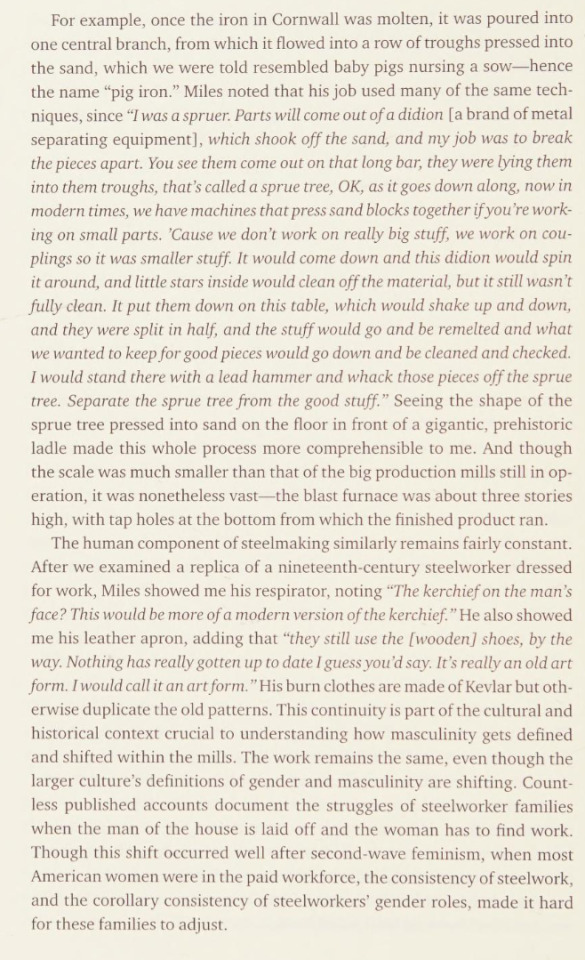
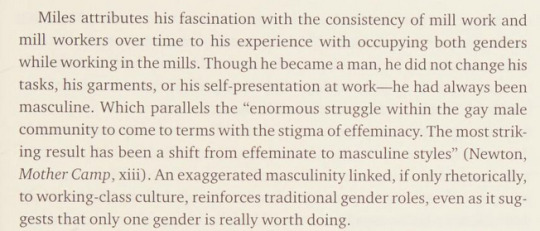
Steel closets : voices of gay, lesbian, and transgender steelworker by Anne Belay, available on the Internet Archive
Transcript:
Miles began working in a steel mill in 1999 as an out lesbian, but he quit about eight years later because of repeated shoulder injuries and general exhaustion. He says it's not really accurate to say that he transitioned while working at the mill, since "we never really have a transition. We'll always be transgendered because our past experiences and history go along with us. So I'll always consider myself transitioning." I met Miles at the Cornwall Iron Furnace just outside of Philadelphia. It's a National Historic Landmark, pre- serving a nineteenth-century ironmaking complex and documenting the ironmaking process, as well as its effect on the area around the furnace and the workers' lives. Miles had suggested this meeting place, noting that he had always wanted to see the exhibits. He was curious about the history of the steelmaking process, and tickled by seeing his huge, powerful, mascu- line job echoed within this seemingly fragile incarnation made of bricks, and described for us by local elderly ladies.
For example, once the iron in Cornwall was molten, it was poured into one central branch, from which it flowed into a row of troughs pressed into the sand, which we were told resembled baby pigs nursing a sow-hence the name "pig iron." Miles noted that his job used many of the same tech- niques, since "I was a spruer. Parts will come out of a didion [a brand of metal separating equipment], which shook off the sand, and my job was to break the pieces apart. You see them come out on that long bar, they were lying them into them troughs, that's called a sprue tree, OK, as it goes down along, now in modern times, we have machines that press sand blocks together if you're work- ing on small parts. 'Cause we don't work on really big stuff, we work on cou- plings so it was smaller stuff. It would come down and this didion would spin it around, and little stars inside would clean off the material, but it still wasn't fully clean. It put them down on this table, which would shake up and down, and they were split in half, and the stuff would go and be remelted and what we wanted to keep for good pieces would go down and be cleaned and checked. I would stand there with a lead hammer and whack those pieces off the sprue tree. Separate the sprue tree from the good stuff." Seeing the shape of the sprue tree pressed into sand on the floor in front of a gigantic, prehistoric ladle made this whole process more comprehensible to me. And though the scale was much smaller than that of the big production mills still in op- eration, it was nonetheless vast-the blast furnace was about three stories high, with tap holes at the bottom from which the finished product ran.
The human component of steelmaking similarly remains fairly constant. After we examined a replica of a nineteenth-century steelworker dressed for work, Miles showed me his respirator, noting "The kerchief on the man's face? This would be more of a modern version of the kerchief." He also showed me his leather apron, adding that "they still use the [wooden] shoes, by the way. Nothing has really gotten up to date I guess you'd say. It's really an old art form. I would call it an art form." His burn clothes are made of Kevlar but oth- erwise duplicate the old patterns. This continuity is part of the cultural and historical context crucial to understanding how masculinity gets defined and shifted within the mills. The work remains the same, even though the larger culture's definitions of gender and masculinity are shifting. Count- less published accounts document the struggles of steelworker families when the man of the house is laid off and the woman has to find work. Though this shift occurred well after second-wave feminism, when most American women were in the paid workforce, the consistency of steelwork, and the corollary consistency of steelworkers' gender roles, made it hard for these families to adjust. Miles attributes his fascination with the consistency of mill work and mill workers over time to his experience with occupying both genders while working in the mills. Though he became a man, he did not change his tasks, his garments, or his self-presentation at work-he had always been masculine. Which parallels the "enormous struggle within the gay male community to come to terms with the stigma of effeminacy. The most strik- ing result has been a shift from effeminate to masculine styles" (Newton, Mother Camp, xiii). An exaggerated masculinity linked, if only rhetorically, to working-class culture, reinforces traditional gender roles, even as it sug- gests that only one gender is really worth doing.
20 notes
·
View notes